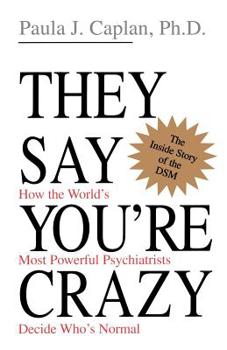They Say You're Crazy: How the World's Most Powerful Psychiatrists Decide Who's Normal
Select Format
Select Condition 
Book Overview
The inside story of the process by which the mental-health elite judge us all How are decisions made about who is normal? As a former consultant to those who construct the "bible of the mental-health professions," the DSM (Diagnostic and Statistical Manual of Mental Disorders), Paula Caplan offers and insider's look at the process by which decisions about abnormality are made. Cutting through the professional psycho-babble,...
Format:Paperback
Language:English
ISBN:0201488329
ISBN13:9780201488326
Release Date:March 1996
Publisher:Da Capo Lifelong Books
Length:382 Pages
Weight:1.00 lbs.
Dimensions:0.8" x 5.6" x 8.3"
Customer Reviews
3 ratings
Shocking! Makes you think about ALL categorizations we use.
Published by Thriftbooks.com User , 20 years ago
Caplan spends a lot of time developing an ideology around what American society views as normal and what it doesn't, and how we come up with those categories, as well as the consequences for those who don't happen to fit into the "normal" category. One of her main premises is that because of the categories in the DSM, women can almost never be categorized as normal. She further describes her journey in trying to keep particular categories out of the book that would have marginalized women further, using scientific data that actually refuted the non-scientific process the psychiatrists used to place categories and their criteria in the book. It was sometimes something as "lofty" as, "My wife has that symptom." "Oh, well, we'll take that one out then." Her book is powerful, because it demonstrates the social construction of concepts like "normal," the power of labeling people "abnormal," the relative power and authority one must have to label someone "abnormal," and how much easier it has been for males to do it to females in the medical (esp. the mental health) establishment because until recently, females have been kept out of medicine. Because her book is coming from such a strong "powerful vs. the powerless" perspective, it does lack a strong point that could have made this a more balanced view, and that is how individuals, even though they may lack power relative to the "labelers," can be complicit in their labeling. There can be benefits to being labeled, such as that it can legitimize women's complaints to have an official diagnosis, it can relieve individuals of full responsibilities for their actions or duties, it can give people an identity, and give people the illusion that the problems are contained within themselves rather than the environment or social structure in which they live, which probably won't change. All of these reasons help explain why people might accept a label or even label themselves. Caplan only seems to suggest that people are labeled against their wills and that's the end of it.
They Say Women are Crazy
Published by Thriftbooks.com User , 22 years ago
Paula J. Caplan's book They Say You're Crazy: How the World's Most Powerful Psychiatrists Decide Who's Normal questions the validity of the DSM. Although psychiatrists claim that their manual is based on science, this is not always the case. Dr. Caplan describes how psychiatrists that decide who is normal "...too often slot people into categories for politically, economically, and emotionally charged reasons while pretending that they are operating in a solidly scientific way" (p. 34).Caplan is a clinical psychologist and a feminist that criticizes mental disorders that are specifically for women. Regardless of the author's motivation for fighting these "disorders" and speaking out against them, she exposes many startling aspects of psychiatry. Disorders are voted into existence with little or no empirical evidence. Caplan comments on the DSM:"To the untutored eye, and even to many mental health personnel, the DSM appears grounded in science, although many features that give this impression turn out on inspection to provide only a veneer of scientific sheen rather than genuine, carefully supported research. (p.186)"Perhaps the most interesting parts of the book were where the author describes her personal experience working with the DSM committees for PMDD and SDPD. However, it is not much of a story because the committees did not really want her involvement, and left her out of most of the process. This aspect of the book is a unique contribution to the works of DSM criticism.
A must for all psychology students.
Published by Thriftbooks.com User , 25 years ago
A well-researched, inside view of how psychological diagnoses are created. Paula Caplan, an APA "Eminent Psychologist", clearly explains the pitfalls and dangers inherent in the process, and the implications for the lives of millions of clients.






